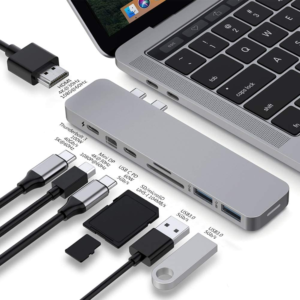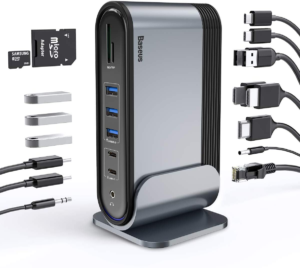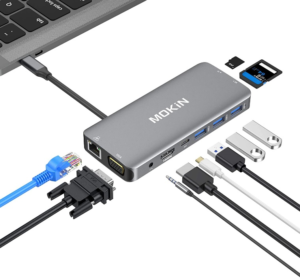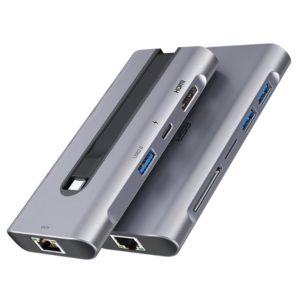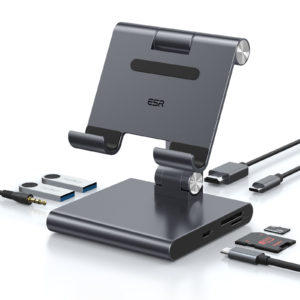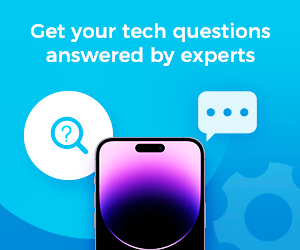The three ways to expand your PC or MacBook’s ports and functionalities are USB-C hubs, docking stations, and multi-port adapters. They all offer almost the same functions but are different in size, appropriateness of use, and price. Most tech-savvy individuals would wish they wouldn’t have to buy any of these three, but modern laptop designs have made this impossible. As systems get thinner and lighter, some of the prices that users have to pay are fewer ports and smaller screens.
MacBooks are particularly notorious for not having enough ports. Apart from two USB-C ports and maybe an HDMI port, you can hardly find any other to connect external hardware – not even a flash drive! So, if you’ve found yourself having to choose among the three options, kindly pay attention to their descriptions in this article. They will help you know the difference and where they may be most appropriate.
USB-C HUBs
One smart way to expand your computer’s limited ports, especially MacBooks, is by using USB-C hubs. This device comes in different designs, depending on the manufacturer. Some are without cables; others are with wires. Not all USB-C hubs allow charging; if you want to charge with any of its USB-C ports, you must confirm that your choice allows that. You will get at least seven sports for most modern versions consisting of USB-A, USB-C, HDMI, SD/MicroSD, audio jack, and RJ45 Ethernet ports from a single hub.
Many USB-C hubs are very portable, and they are suitable for travelers who may need them on their journeys. When buying one, check the number and type of ports, the material, the data transfer speed, and the price. The price can range from $50 for a simple and effective hub to $100 for a more elite and luxurious version. However, a high price tag does not always mean quality. Lesser-priced USB-C hubs may be appropriate for you if you’re budget-constrained.
Docking Station
A docking station transforms portable devices like laptops and iPads into a full-blown desktop replacement. Unlike USB-C hubs, they do not derive their power from your devices but are plugged independently into wall sockets from where they charge your laptop and external hardware. With this device, you are increasing your system’s functionality as it allows you to connect to two extra monitors.
Docking stations are not necessarily useful because your portable devices lack adequate ports; you may have all the ports with your system and still need a dock station. Dock stations often come with two large screens and multiple ports that you can connect to your other external devices. For instance, if you’re a programmer and you work with a PC, you may need a bigger screen to enlarge everything on your laptop.
The connecting ports of a dock station are often USB-C, USB-A, or Thunderbolt ¾. However, they are not as mobile as USB-C hubs and adapters.
Multi-Port Adapters
With the adapter, you can connect your laptop to older devices that do not have modern connection ports without any loss. The adapter is like a bridge that brings two generations of electronic hardware together to help you do more with your laptop.
Since there are different adapters, the type to buy will depend on your needs. For instance, if your older device does not have an HDMI port but has a USB-C port, you will want to get a USB-C to HDMI adapter. Adapters are usually very compact, and you can take them along while traveling.
Recommended USB-C Hubs
There are various brands, sizes, and capacities of USB-C hubs in the market, and it can become an arduous task to decide which is the best for you. However, based on our research and customer reviews, we will highlight two of the best options for your use.
-
8-in-1 Portable Hub– $49.99
Features
- Compact Design
- Integrated Cable Design
- 100W Power Delivery
- Multiple Compatibility
- 30-day Returns
With this 8-in-1 USB-C Hub, you can connect up to 8 devices to your laptop, tablet, phone, and other compatible devices. It has a USB-A 3.0 port, HDMI port, Micro SD and SD card slots, Ethernet port, and a USB-C input port to connect as many devices as possible. You can take this device anywhere – from home to the office, taking your work and project anywhere. Get amazing clear images faster, up to 5 Gbps data transfers that beat other hubs.
Transfer your files and project while you work on the go. The device is affordable and readily fits into your pockets. In addition, you can now accommodate all kinds of computer-supported devices and will not be restricted to the type of port available on your laptop or PC.
-
8-in-1 Portable Stand Hub– $59.99
Features
- Adjustable Stand
- 100W Power Delivery
- Multiple Compatibility
Transform your tablet and iPad into a workstation anywhere you go with this 8-in-1 Portable Stand Hub. With its USB ports, HDMI port, micro SD and SD card slot, and a 3.5mm audio jack, you can do much more. The stand is portable and foldable as you can fold it to aid reading and writing, depending on your work mode.
You can enjoy ultra-speed fast charging for your devices plug with this stand hub, and share documents, images, and other media from your devices with your tablets. Take it anywhere you can as you can easily fold it in your bag as you move from home to the office. The image, sound, and video quality are crystal clear, with light speed data transfer from the device.
Conclusion
Now that you know the difference between the USB-C hub, docking station, and the adapter, you can determine which one is suitable for your need. And you can select any of the two devices we featured here as the best with their fantastic quality and features. For example, suppose you are using a laptop or a tablet. In that case, you can select the USB-C hubs featured above and enjoy freedom in moving work and projects from the office and home with access to 8 different port spaces to work with while sharing and transferring data at lightning speed and unmistakable quality.

